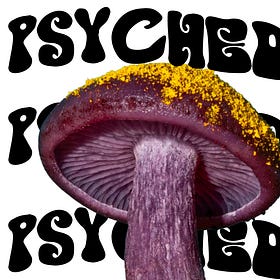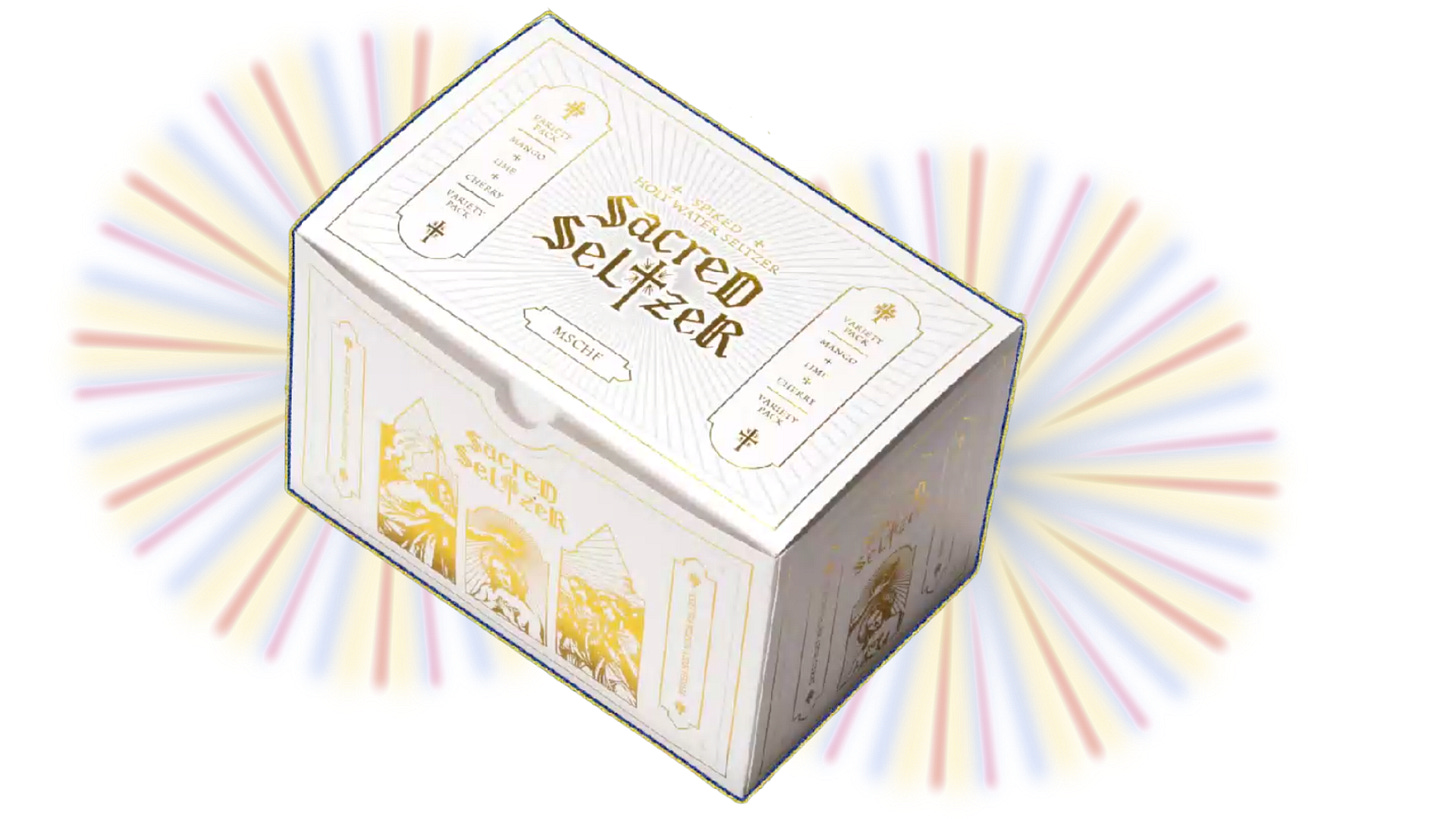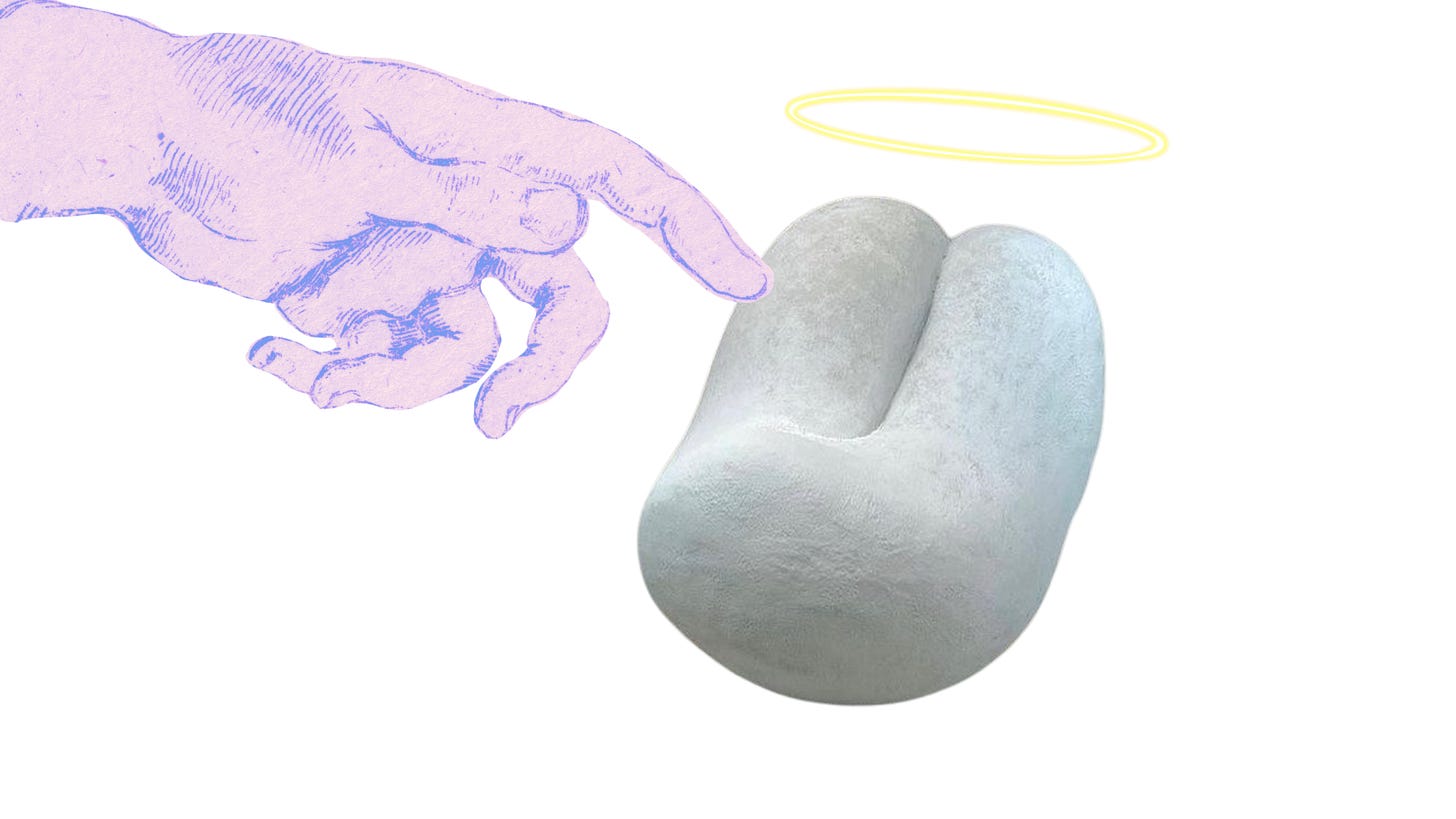Holy Snax: Losing Our Religion
Getting high with the Most High
From the archives, and a relevant read over Easter and Passover.
Losing Our Religion
Memories of growing up Catholic, though no longer something I profess, always included eagerly waiting for communion time, not because I was one eager to partake in spiritual cannibalism (sorry but can we talk about this?) but because those wafers were the closest thing to a snack, particularly at times when the priest overextended the sermon, or whenever it was one of those holidays that always added on an additional hour to this Sunday ritual. In typical millennial fashion, Catholicism lost its fad for me, the more I wanted to question where these rituals came from, the more I realized these traditions stemmed less about “higher power” but had to do more with the history and rituals at the time of the birth of Christianity, that is that consuming bread and wine in communion, were more of a Roman tradition.
“But Rabbi, if you think about it, manna was basically the first snack to offer spiritual uplifting”
See in Roman times, bread was baked twice in order to be preserved (where the italian word biscotti comes from, the latin bi(twice) cotti(cook) —in order to remoisturize the bread to make it edible, Romans would dip it in wine (consider that coffee had not yet made it to that part of the world) this is also where we get the origins of “dunkin’ donuts” in case you were not aware. Christians added on that “functional” aspect of it, as in that it represents said person, and that by partaking of this “offered cup” and meal, we are somehow in spirital union with Christ. In Judaism however, bread and wine, though still part of a spiritual celebration, is seen more as accessories that help aid in that sentiment of commemoration, through the reciting of Kiddush and the prayer over challah, food in this ritual serves as itself, as opposed to some alchemical channel.
Though Abrahamic religions are not the only ones that involve food and beverage in religious rituals, whether mushrooms, coca leaves or kanna chews, we’ve relied on these to be in some way or another channels, where we can connect with whatever we may believe or perceive as “higher power.” In this scientific journal piece, “Getting High with the Most High” it is argued that there is enough evidence to believe that what Moses experienced in the sinai desert, could possibly be tied to psychedelics, considering that plants that have the same psycho active properties as Ayuahasca, have been found there, could manna have been a psychedelic of sorts? We explore more of the psychedelic aspects of snack and their origins here.
Snaxshot #40: Legal Psychedelics
A newsletter on upcoming food and beverage trends that offers a curation of brands and aesthetics written by Andrea Hernández.
Back in this millennia, it is important to note the huge paradigm shift that is, Millenninals leading the movemenet of untethering ourselves from organized religon, but ..we are human after all, and if history can teach us one thing with certainty, is that we seem to want to believe in the notion that there is something that exists beyond this plane, be it spiritual, supernatural, or an extension of our reality—be it religion, corporations, ideals, etc, tribalism is our most inherent default, centralized around shared visions. So it came to no surprise to me, when I began to pick up on the rise of beverages and snacks, wanting to offer us a similar promise, “sacredness,” “cleansing,” and “spiritualness” —when I first came across Dayse, a beverage that lists its said function as “spiritual uplift” I couldn’t help but let out a chuckle, leave it to the generation of instant gratification to think that we can achieve nirvana in the sip of a drink.
Noticing this led me to put out a call for any type of spiritual leader to discuss this trend, and ask whether or not they had partaken in them. “But Rabbi, if you think about it, manna was basically the first snack to offer spiritual uplifting” I said to Rabbi Michael S. Friedman, from Temple Israel in Conneticut. He chuckled, and though he may not be your typical snaxboi, he was aware of what I was talking about, “like that drink that says meditation in a can” —though briefly, we did discuss how my generation seems to be “hacking our way into spirituality” via these items, as opposed to wanting to actually do the work, meditation is a practice no?! He related how “mood altering” can be seen in multiple spiritual practices, from Abrahamic ones to yoga, to even running, he mentioned as an avid runner himself. Rabbi Friedman works everyday in helping bridge religion that is millennia old with newer generations, but does not believe these functional snacks will have a major part to play.
Back in 2019, one of my favorite food writers, Alicia Kennedy, deep dived into the rise of commodification of wellness via beverages like Kin Euphorics, who now holds Bella Hadid as co-founder, adding to its incresasing popularity. Defined by us as “functional unwinding” —wellness and spirituality go hand in hand, but does drinking palo santo water really sage our insides, and what the fuck does that really mean? A proper question to ask when snacks talk about “healing” —take Lunae Sparkling for example, here is their beverage description:
“12 X Lightly Sparkling Palo Santo Water with 24 hour immersion of positively charged Smoky Quartz crystal.
Palo Santo water is also used to aid digestion, support meditation and energetic protection.”And it’s not just beverages, it’s funny to see even a chocolate bar, like these from Vosges:
“Our chocolate is infused with a 528 hz healing sound frequency to raise your vibe”This could also tie back with my theory that we are having a sort of Renaissance period, back when potions and elixirs where all the rage, need spiritual protection, try your local apothecary, sorry I meant, Erewhon!
DTC—Direct to Communion
Even organized religion, take Catholicism, has been working on making it convenient for those who still want to partake in millennia old rituals in modern, post pandemic times, hello virtual mass? True Vine, is an actual, DTC (direct to communion) company that sells prefilled communion cups, they also offer unleavened and gluten free options for the wafer, and here’s hoping sometime soon, they’ll offer THC-infused ones as well. What does it mean then, that we would be able to receive sacraments in RTD format? What does it mean when you can purchase blessed wine on the internet as well as holy water? Well, if you ask MSCHF, it means that this space is ripe for disruption, not a stranger to taunting organized religion, earlier this year, they launched Sacred Seltzer, a spoof on hard seltzer made from actual blessed water* (*in the county of LA, here’s a video of the blessing)
MSCHF’s “Sacred Seltzer” isn’t the first to offer a spoof of holy water, which by the way is very easily purchased online, but also the aesthetics are so on point here. Are food and beverage just taking a page out of organized religion who seems to already be wanting to capitalize on convenience just as equally? Holy Water and Hohly water, both hard seltzers that use the word “sacred” maybe too losely, came out prior to this MSCHF drop. BASBAS a liquor that has impecable baroque vibes, also describes itself as an elixir that sages from the inside.
Do we really believe, drinking a literal depressant can get us closer to a state of nirvana? Hey, consider we connect “happy hour” to alcohol, I would say marketing is the key factor here. With us undoing indoctrinations into organized religions though, are spiritual buzzwords the new “organic” — and what are the implications for consumers, when this is less about offering wellness benefits, but spiritual ones? Will we see churches spring up their own curated shops with “Pope” approved $6 elixirs, or maybe we will see synagogues offer Concord grape spritzers a la Ruby, what say you Manischewitz?!
Taste Temples
Food and beverage serve as channels into an alter state, and if that is that case, then what role do our tongues play into all of this? Could the ressurgence of mindful eating, “palate re-trainings” now that sugar has been proven to alter how we perceive taste over time, even the rise of supper clubs and sober curiosity post pandemic, all be a way for us to purify our temples, that we use to connect in the most inherent, human and divine way?
In his beautifully penned essay, “Con la boca abierta hacia el Señor” (with mouth open to the Lord) Chef Giuseppe Lacorazza from Gula writes—
It can be the mouth where God, food and drugs meet in our bodies, the sensual G-spot of our spirituality. A wafer, an oyster, and an acid tablet land on the tongue.
Most recently came across Tongue Planet, a sensorial cafe in Seoul, S. Korea that is like a taste temple, where you can find different rooms that are hoping to aid you in extending the moment between your tongue and whatever you ordered to snack on. “After all, the tongue is your space, put your moment in this space.” —reads a napkin, an outline of a red tongue as their logo, can be found in neon and cookie form across the cafe. In one of the spaces, a giant concrete tongue is displayed as the only object in the room, one of my favorite visualizations of how food and beverage have always been intertwined in rituals, the concrete tongue, in this case, can be seen in the same way as a pyramind in Chichen Itza, built to symbolize something greater.
The tongue being elevated as this ultimate receptor, one that merits and warrants its own reverance apart from the other senses, can lead one to believe that this new wave of “spiritual snack” is just beginning, and we might see further explorations in the intersection of both. Consider that psychedelic and psychoactive snacks have been increasingly on the rise, with the appeal and promise of easing our way into what lies beyond the ether, it seems only natural to believe that those rituals that don’t involve a more comprehensive mind altering experience(say ayahuasca ceremonies) will continue to be commodified, for good or for bad, as the more untethered we become with the old, we are quickly seeking to ground ourselves to new promises. If you too have chosen, salvation through consumption, then it should not feel out of the ordinary to think that sipping a spritz, can lead you to a religious experience, and won’t that feel… divine.













